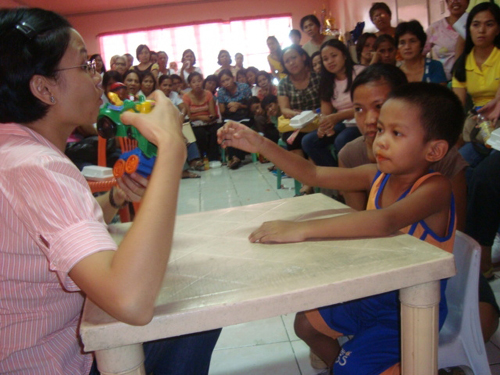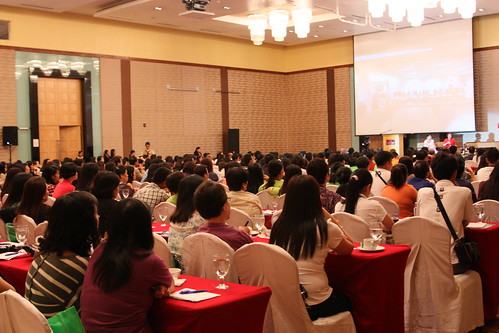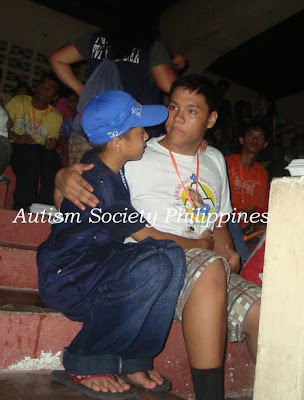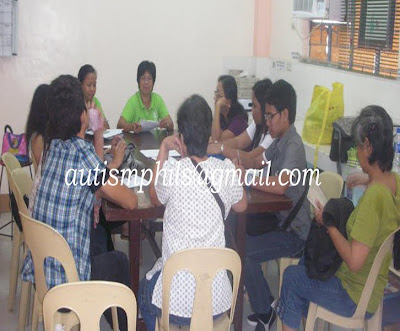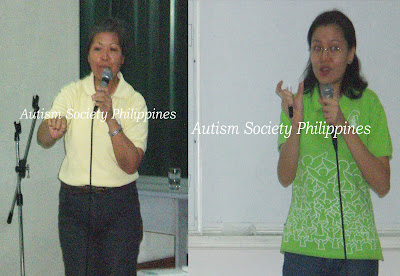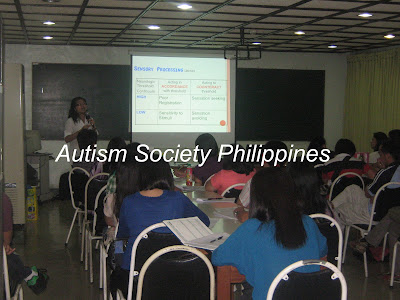By: Michelle Velete
Philippine Daily Inquirer Page II "Back to School Essentials" When School's about to start, most parents worry about tuition fees, school uniform, daily allowances and back to school supplies. So they plan ahead to avoid cramming on budget and to skip having to deal with huge crowds in supermalls.
But if you have a child with special needs, the pressure is greater than simply saving enough for things that money can buy.
Peng So, a mother of four, had far serious things to worry about. For her third son Patrick, most especially, budget is the least of her worries.
Some mother's feel anxious about their children's first day of school because they might not fit in with the rest of the kids. For so, she worries more if people notice her son is different. And thus, treat him differently.
When Patrick was about three, So noticed he couldn't talk yet. Her mother-in-law told her it was nothing, that he was just "delayed" as most male babies are. She didn't feel worried too, since he was still very young, he ate right, and had no apparent health problems anyway. However, her sisters felt that there was something different about her son. To cast all doubts, she decided to consult a developmental physician.
The first diagnosis was her son had Pervasive Developmental Disorder-Not Otherwise Specified (PDD-NOS). It's just a mild personality disorder, the doctor said. He would eventually get it over with. But after a few more observations, Patrick showed other manifestations of autism.
 |
| Patrick and Mom Peng So |
According to the Autism Society Philippines (ASP), some of the signs and symptoms of autism include "difficulty in mixing with other children; no fear of real dangers, resisting change in routine, indicating needs by gesture, standoffish manner, spinning objects, resisting learning, acting as deaf, no eye contact, among others".
This checklist however however, is only "one diagnostic tool when considering a possible cause of autism". Every patient should still undergo "medical developmental and intelligence tests" for confirmation.
It was finally revealed that he has autism and Attention Deficit Hyperactivity Disorder (ADHD).
"I was in denial at first. I thought that there will be a magic cure someday and everything will be all right. But i realized that it's not the way to do it. So I took upon myself the responsibility to do the best I can in taking care of him".
It was hard to break the news to his son while he was growing up. However, when he was 8 or 9, he asked: "Mom, am I autistic?"
She didn't answer. Instead, she let her kid discover the truth on his own.
TRUTH AND MEANING Explaining autism to a child is one of the hardest things to do, especially when your child lives with it. Hence, So decided to explain using the most traditional means --- the dictionary.
"However, I thought the definition sucked. It actually leaned more towards schizophrenia," she shared. She told her son that he wasn't as the good old dictionary described. She decided to just bring him to certain activities that would expose him to kids like him.
"Autism is like a spectrum, where every kid has their unique characteristics. Patrick saw how some kids behave and how they are similar and yet different from each other," So shared. According to So, there are high and low functioning levels among autistic kids. While others excel intellectually than most, some have more developed social skills than others. Once, Patrick pointed to one of the kids who was rocking and crying, and asked, "Mom, is he crazy?" To which So replied lovingly: "No, he has autism."
Slowly, Patrick became used to what he sees, which slowly defined what he is. Eventually it was easy for him to accept and understand, So said. It became, ironically, a normal thing for him.
STRUGGLES AND SUCCESS He has a dry sense of humor. He takes random pictures of people, even strangers. He likes to touch people in uncomfortable places. He ignores you when you try to talk to him. He talks and talks and never listens.
These are some of Patrick's unique personalities. So knew that "even if he wasn't talking, it doesn't mean he wasn't learning." So she really taught him how to read, using props like big flash cards to enhance his kid's intelligence. She would also leave books scattered on the floor because Patrick would eventually get curious and start looking at them. He finally learned to read and became really good in Math. To date, he loves going to a book sale club, and reads car magazines, Popular Science, Time and Discovery. He also loves to play video games, like Civilization and Cityville.
So knew she had to raise him like a normal kid. With the advice of doctors and friends, she sent him to a regular school. The process was painstaking. It was not a walk in the park, but found it hard to erase the unfortunate stigma.
"two schools rejected him. One of them said he did not qualify (academically), to my disbelief. I asked if I could see the results but the school said they have the right to keep the scores confidential," she shared disappointingly.
"Another one told me that they just didn't have the right equipment for him" she said. "I told them they can treat him like any normal kid and I can help assist with anything else, but they declined".
She became used to the rejections and used to cry about it. But she didn't lose hope.
Finally, Paref-Northfield School for Boys welcomed him with an open heart. In high school, his teachers were constantly awed when he won several Math competitions.
On his junior year, however, Patrick requested to transfer schools. He told her that he wanted to learn how to deal with girls. "How can I understand them if I went to an all-boys high school?" he asked.
Her fear for another series of rejection weighed her down. One time, Patrick saw a rejection letter. Crying, he asked, "Mom, am I not good enough?" That broke her heart.
Fortunately, a co-ed school in Manila believed in Patrick's talent and readily accepted him. Patrick excelled in Science this time, even winning regional and national competitions. However, he went back to Paref on his senior year because he wanted to graduate with his old classmates.
To date, he's an incoming third year at the Ateneo De Manila University, taking up BS Life Science. He also plans to take up a Masters and PhD degree after graduation.
Little by little, So knew that the heartbreaks brought by the past made Patrick triumphs today much, much sweeter.
THE SPECIAL CHALLENGE Still, being a mother to children with autism is daunting. "He doesn't really have friends," So shared sadly. "He has difficulty putting himself in other people's shoes and building a relationship with anyone". Being a friend, according to her, means empathizing with people. That is something Patrick finds hard to understand. Patrick himself admitted that at 21, communicating and socializing is still a challenge.
"I realized that he'll only be friends with people exactly like him. I wish someday he'll be able to find somebody who will love him as he is," So said. "I just want him to be happy".
So believed that mothers like her who have special children should invest a lot of hard work, patience and unconditional love. They also need to be exposed in the real world. "Be hands on. Learn as much as you can about autism. Give him all the therapy he needs. Look at their strengths and see how we can use these to train or teach them," she shared.
"More importantly, set realistic goals for them," So added.
"Moreover, work on the environment. I've been working hard to raise awareness on autism here in the Philippines because I want the society to learn to accept my son and others like him," added So. So is currently the Vice President of Autism Society Philippines, who advocates for the well-being of persons with autism spectrum disorder. ASP envisions an environment that empowers persons with autism spectrum disorder to become the best that they can be, and be self-reliant, productive and socially accepted members of the community. It works to establish institutional mechanisms to support persons with autism and their families.
Ultimately, So believes parents need to teach their kids "how and why to do certain things," and not to do things for them all the time. Sometimes, you let them grow by letting them go. It also works for the rest of us.
Uploaded with permission
Acknowledgments to Supplements Head
Mr. Jong Arcano and Philippine Daily Inquirer Supplements Section


